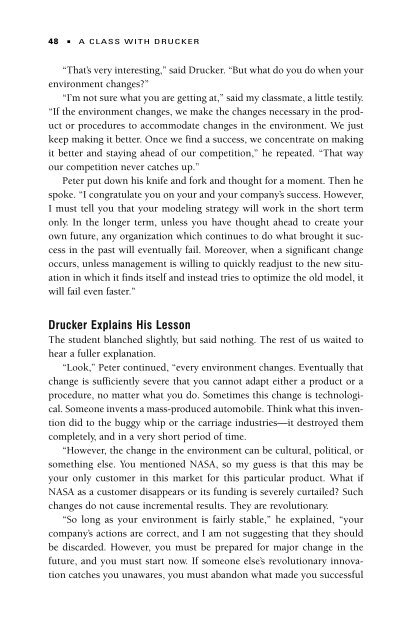A Class with Drucker - Headway | Work on yourself
A Class with Drucker - Headway | Work on yourself
A Class with Drucker - Headway | Work on yourself
You also want an ePaper? Increase the reach of your titles
YUMPU automatically turns print PDFs into web optimized ePapers that Google loves.
48 ■ A CLASS WITH DRUCKER<br />
“That’s very interesting,” said <str<strong>on</strong>g>Drucker</str<strong>on</strong>g>. “But what do you do when your<br />
envir<strong>on</strong>ment changes?”<br />
“I’m not sure what you are getting at,” said my classmate, a little testily.<br />
“If the envir<strong>on</strong>ment changes, we make the changes necessary in the product<br />
or procedures to accommodate changes in the envir<strong>on</strong>ment. We just<br />
keep making it better. Once we find a success, we c<strong>on</strong>centrate <strong>on</strong> making<br />
it better and staying ahead of our competiti<strong>on</strong>,” he repeated. “That way<br />
our competiti<strong>on</strong> never catches up.”<br />
Peter put down his knife and fork and thought for a moment. Then he<br />
spoke. “I c<strong>on</strong>gratulate you <strong>on</strong> your and your company’s success. However,<br />
I must tell you that your modeling strategy will work in the short term<br />
<strong>on</strong>ly. In the l<strong>on</strong>ger term, unless you have thought ahead to create your<br />
own future, any organizati<strong>on</strong> which c<strong>on</strong>tinues to do what brought it success<br />
in the past will eventually fail. Moreover, when a significant change<br />
occurs, unless management is willing to quickly readjust to the new situati<strong>on</strong><br />
in which it finds itself and instead tries to optimize the old model, it<br />
will fail even faster.”<br />
<str<strong>on</strong>g>Drucker</str<strong>on</strong>g> Explains His Less<strong>on</strong><br />
The student blanched slightly, but said nothing. The rest of us waited to<br />
hear a fuller explanati<strong>on</strong>.<br />
“Look,” Peter c<strong>on</strong>tinued, “every envir<strong>on</strong>ment changes. Eventually that<br />
change is sufficiently severe that you cannot adapt either a product or a<br />
procedure, no matter what you do. Sometimes this change is technological.<br />
Some<strong>on</strong>e invents a mass-produced automobile. Think what this inventi<strong>on</strong><br />
did to the buggy whip or the carriage industries—it destroyed them<br />
completely, and in a very short period of time.<br />
“However, the change in the envir<strong>on</strong>ment can be cultural, political, or<br />
something else. You menti<strong>on</strong>ed NASA, so my guess is that this may be<br />
your <strong>on</strong>ly customer in this market for this particular product. What if<br />
NASA as a customer disappears or its funding is severely curtailed? Such<br />
changes do not cause incremental results. They are revoluti<strong>on</strong>ary.<br />
“So l<strong>on</strong>g as your envir<strong>on</strong>ment is fairly stable,” he explained, “your<br />
company’s acti<strong>on</strong>s are correct, and I am not suggesting that they should<br />
be discarded. However, you must be prepared for major change in the<br />
future, and you must start now. If some<strong>on</strong>e else’s revoluti<strong>on</strong>ary innovati<strong>on</strong><br />
catches you unawares, you must aband<strong>on</strong> what made you successful


